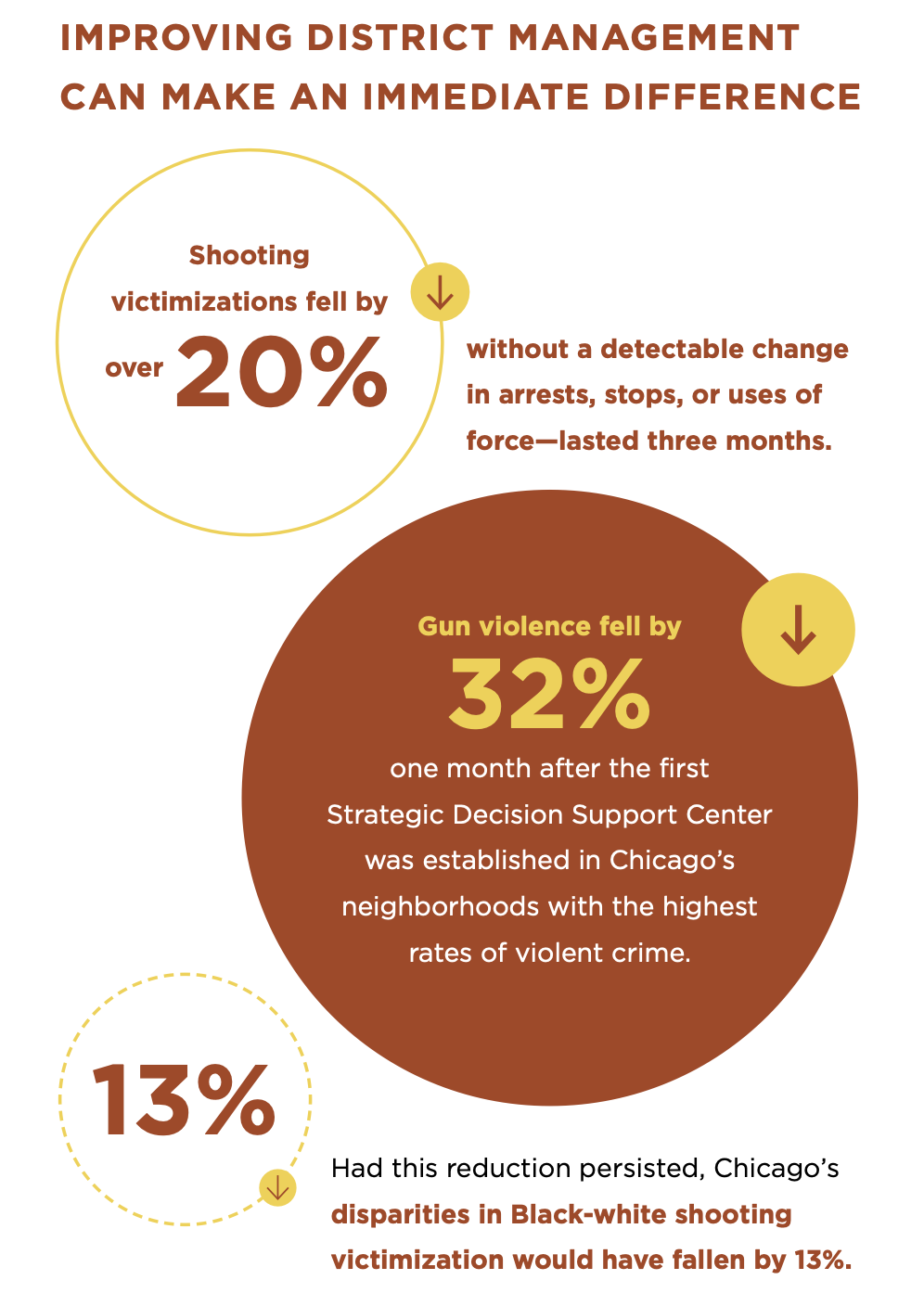Strategic Decision Support Centers

The Crime Lab and the City of Chicago joined forces to implement data-driven management strategies that address gun violence in some of the city’s most heavily affected communities.
Challenge
In 2016, Chicago was left reeling by a massive 60% surge in murders, hitting economically disadvantaged areas the hardest and leading to calls for quick and decisive action to stem the tide.
Opportunity
Without time to wait for new public safety allocations from the city, the Crime Lab partnered with the city to get more out of existing public safety resources by tapping a critically important lever: data-driven management. Management practices at the Chicago Police Department were transformed by Strategic Decision Support Centers (SDSCs) in six of Chicago’s most violent police districts. This led to a remarkable 21% decrease in shooting victimizations within the first three months, with no detectable changes in arrest rates or use of force.
Project overview
Public debates about how to get better policing outcomes have focused primarily on the two levers of funding and strategy. Proposed solutions orient around increasing or decreasing police funding and specific strategies such as community policing. Implicit in the focus on both of these levers is the assumption that policing itself cannot be changed. However, Crime Lab research suggests another lever of improvement: the quality of policing management. In the private sector, good management has long been a focus—and the subject of investment on the order of tens of billions of dollars a year–to get better outcomes out of the same resources, often by incorporating data to drive better, more informed decision-making. But the same focus has, for the most part, not filtered down to the public sector, raising the question of whether institutions like policing could see similar benefits by implementing management improvements.

Years Active
2017
Topics
Project Leads
Max Kapustin
Assistant Professor, Cornell University

Jens Ludwig
Pritzker Director

Kim Smith
Director of National Programs and External Engagement

When homicides surged in Chicago in 2016, the Crime Lab partnered with CPD to implement management improvements in some of the city’s most violent areas through Strategic Decision Support Centers (SDSCs). Unlike other policing interventions, the SDSCs principally seek to improve management in a district by giving commanders tools and processes to manage their resources more effectively. The SDSCs brought together police officers and analysts to integrate crime intelligence, data analytics, and technology, to reduce the police footprint while also reducing crime. The first SDSCs were implemented in the 007th (Englewood) and 011th (Garfield Park) police districts.
As part of the SDSCs, CPD began embedding civilian analysts in CPD districts to inform district strategy. Crime Lab data analysts were the first analysts to play this role, filling an essential gap while CPD hired and trained their own analysts. The analysts use the wealth of data collected by CPD to create reports for command staff and community-based organizations working on violence prevention. The analyses highlight the repeat incidents, crime patterns, and emerging trends that might inform the command staff’s deployment decisions.
The Crime Lab studied the effect of the SDSCs on crime and the community. The evaluation found that through the first three months of having an SDSC, the districts saw declines in shootings of 21% and violent felonies of 8%, with no detectable changes in overall arrests, traffic stops, or uses of force.
The SDSCs were a collaborative effort between the Crime Lab, the Chicago Police Department, the City of Chicago, and Sean Malinowski, former Los Angeles Police Department Chief of Detectives.
The First 10: A Decade of Impact at the University of Chicago Crime Lab and Education Lab
This 10-year report reflects on the United States’ societal challenges and the steps taken by the University of Chicago Crime Lab and Education Lab to address these issues.

Getting More Out of Policing in the US

Policing and Management
This National Bureau of Economic Research working paper provides an exploration into how management quality can significantly influence the productivity and effectiveness of policing.
